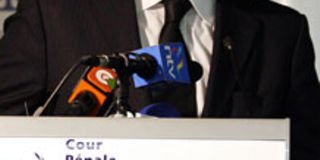Cases will ensure peaceful 2012 election, says Ocampo

The prosecutor of the International Criminal Court Luis Moreno Ocampo gives a press conference in The Hague on December 15, 2010. The International Criminal Court on December 15, 2010 accused six Kenyans of masterminding the 2007-8 post-election violence that claimed 1,500 lives. AFP PHOTO / POOL - ANP - Bas Czerwinski
Prosecutor Luis Moreno-Ocampo dropped a bombshell at the Hague on Wednesday, announcing his intention to charge six Kenyans, five of them prominent, with murder, rape and deportation.
The intended charges relate to the 2007 election violence in which more than 1,000 people were killed, 3,500 injured and 650,000 evicted from their homes.
Among those named are Deputy Prime minister and Finance Minister Uhuru Kenyatta, Orange party chairman Henry Kosgey, former Education minister William Ruto, former commissioner of police Maj Gen (ret) Hussein Ali and Head of Civil Service Francis Muthaura.
Also to be charged is Kass FM journalist Joshua arap Sang.
Mr Ocampo, the International Criminal Court chief prosecutor, told a press conference that the six cited “are the most responsible, but of course there are many others... We concentrate on the most responsible... of course, Kenya can decide to prosecute more.”
“The post-election period of 2007-2008 was one of the most violent periods of the nation’s history,” Mr Ocampo said.
“These were not just crimes against innocent Kenyans,” he said. “They were crimes against humanity as a whole. By breaking the cycle of impunity for massive crimes, victims and their families can have justice. And Kenyans can pave the way to peaceful elections in 2012.”
The ICC said the carnage left more than 1,100 people dead, 3,500 injured and up to 600,000 forcibly displaced. “During 30 days of violence, there were hundreds of rapes, possibly more, and over 100,000 properties were destroyed in six of Kenya’s eight provinces.”
The prosecutor indicated that the quest for justice was far from over.“This is the beginning of a journey, there’s a long journey to justice in Kenya,” he said.
Mr Ocampo accused Ruto of “preparing a criminal plan to attack ... the Party of National Unity” of and inciting violence.“They immediately... began to attack,” he said.
The announcement ends days of nervous tension in government which boiled into recriminations during a Cabinet meeting on Monday.
Many observers will see the Hague trials as self-inflicted: quite apart from leading the country to violence, the political elite thrice rejected efforts to try the suspects locally.
Kenya was plunged into violence after the December 27, 2007 general elections in which Mr Odinga accused Mr Kibaki of having rigged his re-election.
What began as political riots soon turned into ethnic killings targeting the Kikuyu. They in turn launched reprisal attacks in which homes were torched, people hacked to death and others forced to flee their homes in the worst violence since independence. The worst of the violence was in Rift Valley, Nairobi, Kisumu and parts of Central Province.
“The judges of Pre-Trial Chamber II will now review the evidence. If they determine that there are reasonable grounds to believe that the six persons named committed the alleged crimes, they will decide on the most appropriate way to ensure their appearance in court. The Prosecution has requested Summonses to Appear,” a statement said.
The ICC, which started operating in the Hague in 2002, is the world’s only independent, permanent tribunal with the jurisdiction to try allegations of genocide, war crimes and crimes against humanity.
US President quickly responded to the ICC announcement, calling on Kenyans to cooperate with the ICC.“I urge all of Kenya’s leaders, and the people whom they serve, to cooperate fully with the ICC investigation and remain focused on implementation of the reform agenda and the future of your nation,” he said.
Mr Obama, whose father was Kenyan, noted the progress the country has made since the unrest “moving away from impunity and divisionism toward an era of accountability and equal opportunity.”
“The path ahead is not easy, but I believe that the Kenyan people have the courage and resolve to reject those who would drag the country back into the past and rob Kenyans of the singular opportunity that is before them to realize the country’s vast potential,” he said.
The suspects were also quick to protest their innocence, with some welcoming an opportunity to defend themselves at the Hague.
President Kibaki, in statement, made it clear that the suspects should continue to be considered innocent and reiterated his government’s determination to set up a special tribunal locally to deal with the case.
Mr Muthaura, considered the eminence grise of Kibaki’s party and a key figure in the government, said he would have no problem defending himself in the Netherlands if the ICC judges met Mr Ocampo’s summonses request.
“I will voluntarily attend The Hague and respect any request the judges of the ICC have,” said Mr Muthaura, who is accused of planning violence against pro-Odinga supporters alongside Mr Kenyatta.
“The suggestion that I have done anything to warrant criminal investigation is manifest nonsense. It amounts to unwarranted slur on my reputation and is both unfair and unjustified,” he said.




